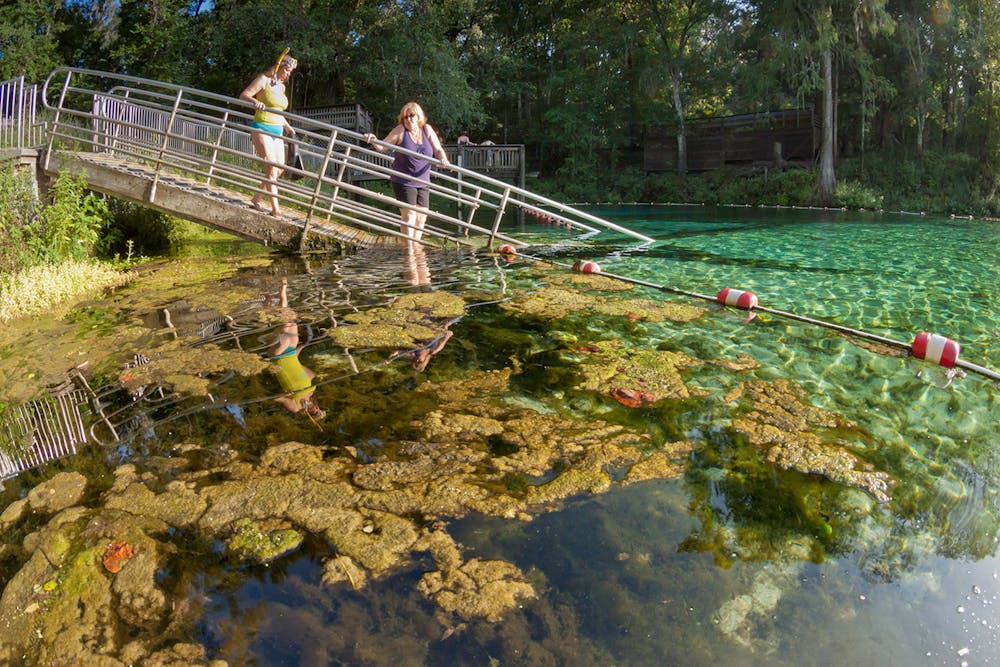Worthington Springs was the first to go. Floridians and tourists flocked to the town starting in the late 1800s to celebrate the Fourth of July holiday. Yet by the mid-twentieth century, Worthington Spring had stopped flowing due to human activity. People stopped visiting, and the spring was abandoned.
Dozens of springs are nestled in or near Alachua County, serving as a valued resource and a recreational draw. However, Florida’s springs have been a battleground for decades. Activists, local and state government officials, corporations and citizens often disagree on the extent to which the springs should be protected.
Robert Knight, the executive director of the Florida Springs Institute, has been monitoring spring health for over two decades. During that time, he said, he’s witnessed the quantity and quality of spring systems decline.
“They’re not going to be healthy for the next generations,” Knight said.
After Worthington Springs stopped flowing, Knight said, the damage continued down the Santa Fe River. First it was Hornsby Spring. Then it was Santa Fe Spring, then River Rise. Then July 15, the clear waters of Gilchrist Blue Spring suddenly turned brown with sediment. Park rangers ushered swimmers from the water, and the park closed until July 17.
A sinkhole had opened up beneath Gilchrist Blue, Knight said, leading to a rush of sediment in the water. While the Florida Springs Institute doesn’t know for certain what led to the sinkhole, Knight believes it was a combination of erosion and excessive groundwater pumping.
Over time, he added, human impacts like these can lead to the full collapse of a spring ecosystem.
“The springs die,” Knight said. “As close to dead as you can get in the environment.”
Knight spoke to the High Springs City Commission Oct. 12, voicing his concerns that human activity would continue to lead to spring degradation. He argued people come to the High Springs area for nature-based tourism, which is put at risk by groundwater pumping and housing developments.
Commissioner Katherine Weitz was the only commissioner to vote against a proposed Bridlewood housing development in October 2022, which she said would build 2,000 units on 700 acres in High Springs. Bridlewood would double the population of High Springs, Weitz said, and possibly put the town’s tourism and natural environment in jeopardy.
“People come here to go to the springs,” she said. “If we’re not protecting that, we’re not protecting our own small economy here.”
BlueTriton Brands, a commercial water bottler formerly known as Nestlé Waters North America, owns a facility in High Springs down the road from the popular Ginnie Springs. Under the state-facilitated consumptive use permit, the company Seven Springs Water Co. is allowed to pump 984,000 gallons of water per day from the spring, which is then bottled and sold by BlueTriton.
On Oct. 17, Administrative Law Judge Francine Ffolkes sided with Seven Springs on its permit renewal, despite vehement opposition from activist groups, like the Florida Springs Council.
BlueTriton declined an interview, but said in a statement that, “BlueTriton Brands looks forward to continuing our work with Seven Springs to maintain the health and long-term sustainability of Ginnie Springs.”
Activists have criticized the Florida Department of Environmental Protection in the past for issuing consumptive use permits, stating it violates laws meant to protect against harm to Florida’s Springs.
One such group, Florida Right to Clean Water, has begun a petition to put an amendment on the Florida 2024 election ballot. The amendment would identify clean water as a fundamental right, similar to that of the rights of free speech and a speedy trial, the organization’s North Florida coordinator David Moritz said.
“Laws that are already on the books that allow pollution have to be considered as unconstitutional by Florida law in the future,” Moritz said.
While the petition already has over 100,000 signatures, Moritz added, it needs about 900,000 signatures to be put on the ballot for the next election cycle.
The Santa Fe River, which winds through Alachua County and is fed by springs, has seen a 30-40% reduction in flow as of 2019. Seven Springs can continue pumping even if the Santa Fe’s flow reduces to a trickle, the president of Our Santa Fe River, Joanne Tremblay, said. When the BlueTriton facility filters the pumped water, it often flushes the impurities back into the river, she added.
The BlueTriton facility is a small fish in a way, Tremblay said.
“But it’s right here in our backyard,” she added. “It’s right on top of one of our most wonderful springs.”
Contact Kylie Williams at kyliewilliams@alligator.org. Follow her on Twitter @KylieWilliams99
Kylie Williams is the Fall 2024 Enterprise Editor and a junior journalism major. Previously, she worked for the enterprise desk as the environment reporter. In her free time, she can be found reading, baking or watching reality TV with her cat.





